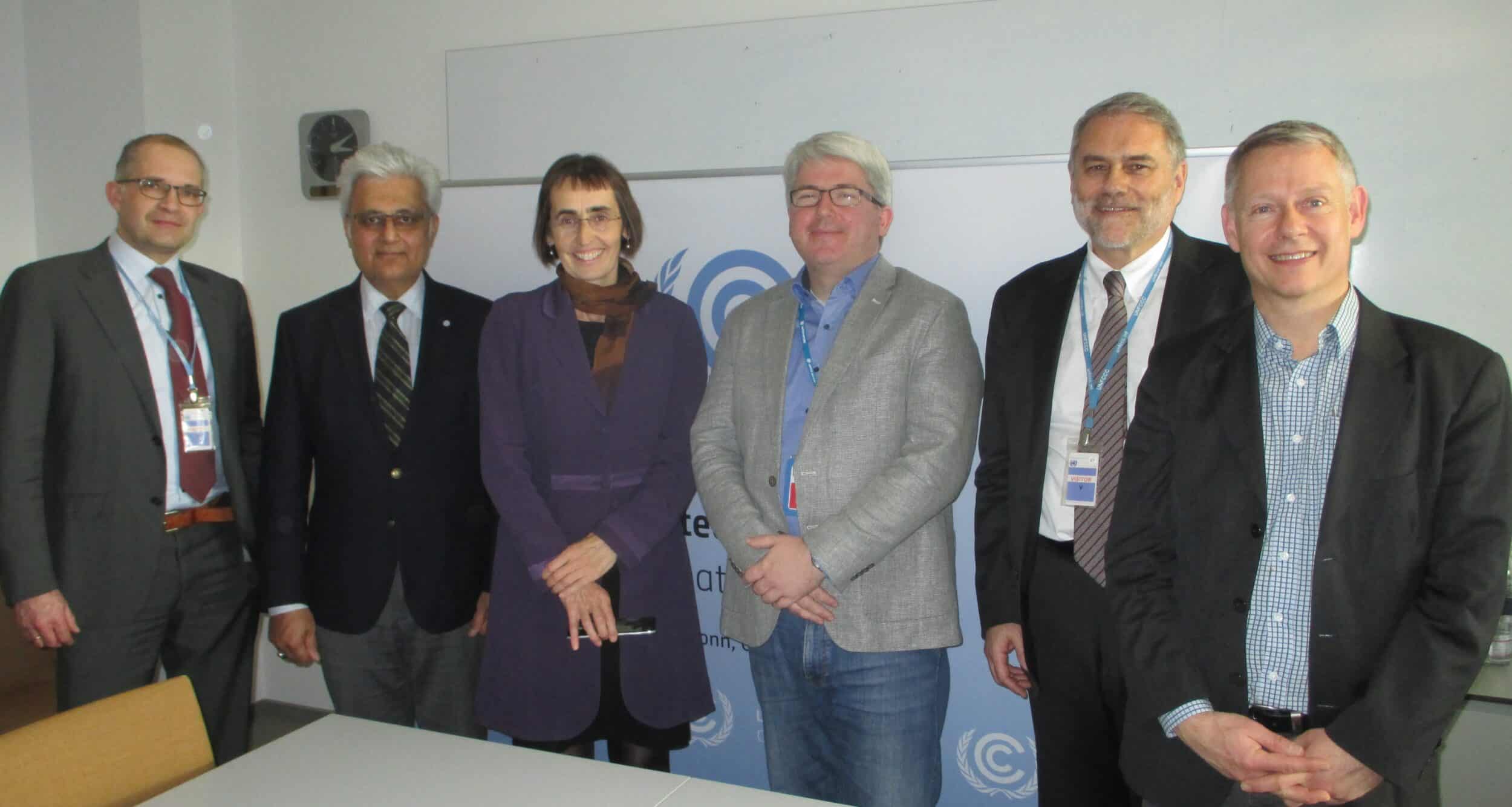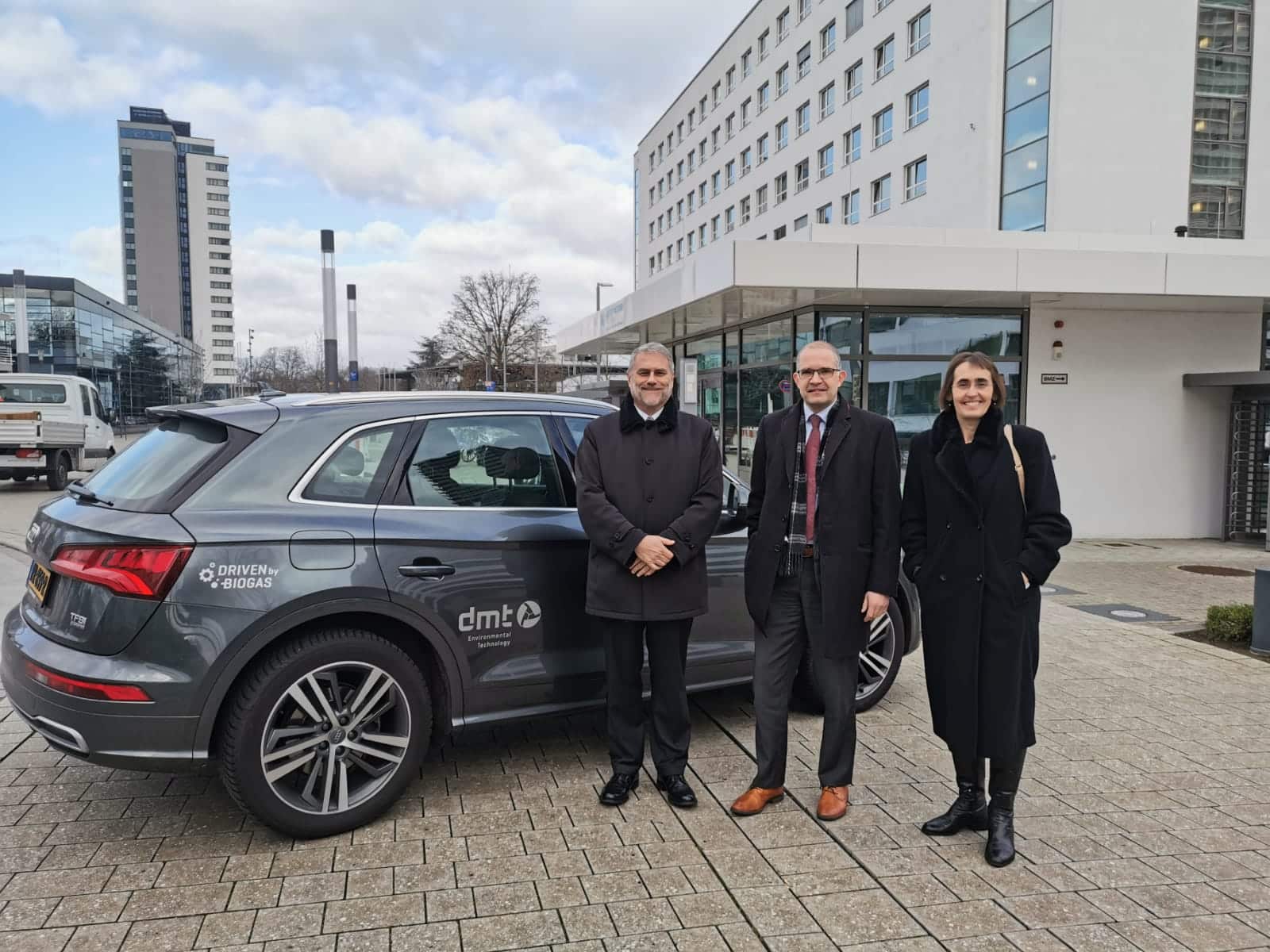
WBA meets with UNFCCC in Bonn to discuss the Biogas and Climate Change Commitment Declaration to deliver major emissions reductions by 2030
- Declaration sets out ambition to reduce global greenhouse gases emissions by 12% by 2030
- Meeting discusses how to gain world governments’ commitment to unlock this potential
- WBA representatives arrive on board a biomethane-powered car
Bonn – 18 February 2020 – David Newman, President, and Charlotte Morton, Chief Executive of the World Biogas Association (WBA), today met with H.E. Ovais Sarmad, Deputy Executive Secretary, UN Climate Change – the secretariat for the United Nations Framework Convention on Climate Change (UNFCCC) – to discuss the implementation of the Biogas Industry and Climate Change Commitment Declaration that was presented to Mr Sarmad at COP25 in Madrid in December. (1)
Signed by WBA and major biogas stakeholders from 11 countries, the Declaration sets out the ambition for the industry to deliver 12% reduction in global greenhouse gases(GHG) emissions by 2030, subject to world governments’ removing current barriers to growth and investing fully in the technology as part of their contribution to meeting their Paris Agreement commitment. The 12% potential equates to the total US GHG emissions in 2012 or that of the EU in 2017.

David and Charlotte arrived at the UNFCCC offices in Bonn on board a biomethane/Bio-CNG-powered Audi Q5, accompanied by Harmen Dekker of DMT Environmental Technology, a biogas solutions provider and member of the WBA Advisory Board, who supplied the car. They were greeted by Niclas Svenningsen, Manager, Global Climate Action, UN Climate Change, who had called for all Paris Agreement signatories to include biogas in their Nationally Determined Contributions at the World Biogas Summit last July, and who also joined the meeting.
David said: “We are greatly encouraged by the progress made since Niclas’ speech at the Summit only 7 months ago. The global biogas industry is determined to play its part in addressing the climate emergency. However, delivering on its huge potential requires the political will from all world nations to move away from fossil fuel subsidies and invest in this mature, readily available technology that can not only significantly mitigate the climate crisis, but also form a cornerstone of global sustainable development. Research has shown that our industry can help meet nine of the 17 UN Sustainable Development Goals. Gaining the support of UNFCCC in raising awareness and securing commitment from world governments is a major milestone towards achieving our 12% GHG emissions reduction goal. 2020 has been declared the Year of Action and we must act, now.”
Talking about the biomethane car that brought the delegation to Bonn, Harmen Dekker said: “This retrofitted Audi Q5 is a great example of the positive impact that the car manufacturing industry can immediately have in decarbonising transport. The technology to adapt diesel and petrol cars to biomethane/Bio CNG is available, and DMT has some very successful example projects done already.
The biogas sector is ready to generate the biomethane needed to power them. What is urgently required to deploy this technology fully is direct support from policy makers and investors for the best well-to-wheel solutions and for biomethane”.
– ENDS –
For further information, contact:
Jocelyne Bia, Senior Communications Consultant, World Biogas Association
e: jbia@worldbiogasassociation.org; t: +44 (0)7910 878510
Notes to Editors
About biogas
The anaerobic digestion process that generates biogas not only produces a renewable source of green energy, but also helps reduce the carbon-footprint of hard-to-decarbonise sectors such as transport, heat and agriculture. It optimises waste management and provides solutions to soil erosion, plastic pollution, and many of the environmental and social challenges that the world faces. It currently employs 350,000 people worldwide and could generate millions more green jobs.
About the biomethane-powered car
• Audi Q5, 2,0 L 4 cylinder
• Transmissions: 8 gears automatic
• Originally built as a petrol car, it was directly retrofitted with a CNG co-fueling system when delivered from the factory. The cost for retrofitting was €5000
• The CNG tank allows to travel a distance of 350-400 km – this is relatively short but can be extended as necessary. The car has also a petrol tank as back-up.
• The car drives on “green-gas” as it refuels at stations which only supply biomethane upgraded from biogas. This generates a negative carbon footprint achieved over the total lifetime of the car (including car production cost).
About the World Biogas Association
Launched at COP22 in Marrakesh in 2016, the World Biogas Association is the global trade association for the biogas, landfill gas and anaerobic digestion (AD) sectors, and is dedicated to facilitating the adoption of biogas globally. It believes that the global adoption of biogas technologies is a multi-faceted opportunity to produce clean, renewable energy while resolving global issues related to development, public health and economic growth. www.worldbiogasassociation.org @wbatweets


